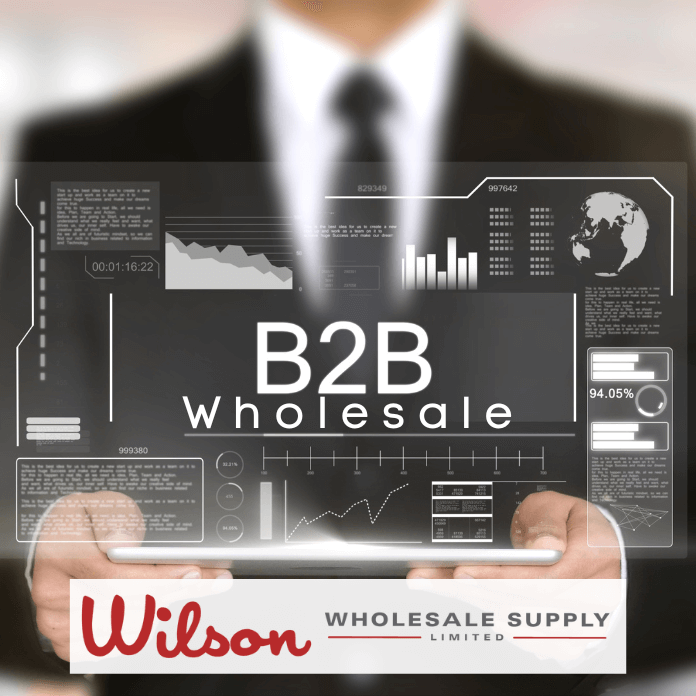Streamlining B2B Wholesale:
Strategies for Efficient Business Transactions
Looking to excel in B2B wholesale? Solid knowledge of the B2B wholesale sector can provide your business with the keys to better supply chain efficiency and access to new markets. This article delivers a straightforward analysis of the entire B2B wholesale process, highlights shifts in the digital landscape, and gives you practical tips to apply directly to your business strategy for effective market navigation.
Key Takeaways
- B2B wholesale is a critical element of the supply chain, involving the bulk selling of products from businesses to other businesses, with a focus on strategies like customer data management, cost-saving, and efficient supply chain management to ensure transactional efficiency.
- The adaptation to digital platforms and e-commerce is a transformative force within B2B wholesale, adding value to the industry by enhancing operational visibility and customer experiences through personalized online interactions and advanced technologies.
- Facing challenges such as rising competition and evolving buyer expectations, B2B wholesalers must invest in digital transformation, implementing solutions like automated fulfillment, flexible payment options, and decisive marketing strategies to sustain growth and market relevance.
Defining B2B Wholesale

In the realm of commerce, business-to-business, or B2B, wholesale stands as a foundational pillar, embodying the process in which one business sells products or services in bulk to other businesses. Acting as a crucial link in the supply chain, wholesalers:
- Purchase large quantities of products from manufacturers.
- Provide them to retailers at wholesale prices.
- Ensure efficient product delivery across a range of business sectors.
This bulk ordering system is the lifeblood of product distribution, fueling industries worldwide with raw materials without the need for wholesalers to engage in manufacturing themselves.
Effectively navigating the B2B landscape involves recognizing the roles of different entities—manufacturers, suppliers, wholesalers, and service providers—in facilitating industry-powering transactions. Understanding these entities and their functions is the first step in mastering the B2B wholesale arena, setting the stage for deeper insights into how businesses can refine their distribution strategies for maximum efficiency and impact.
>B2B Business Supplies Click Here<
Understanding B2B Wholesale Terminology
Grasping the lingo of B2B wholesale is akin to learning the language of business. Here are some key terms to know:
- Stock-Keeping Unit (SKU): a unique identifier for each product, vital for managing inventory and tracking orders.
- Case Packs: bundles specific quantities of a product for ease of retail acquisition.
- Lead Time: the duration required for wholesalers to produce and deliver products to retailers, a critical factor in maintaining a smooth business flow.
Other key terms include:
- Order Minimum: the threshold amount for retailers to place an order.
- Manufacturer’s Suggested Retail Price (MSRP): guiding retailers on pricing for the end consumer.
- Assortment: the variety of products offered.
- Delivery Window: the timeframe for shipping goods.
With these terms and more, businesses worldwide can communicate more effectively, ensuring clarity in every transaction.
The Importance of B2B Wholesale in Today’s Market

The gravitational force of B2B wholesale in the current market is undeniable. In 2022 alone, the B2B wholesale trade in the U.S. generated a staggering $11.4 trillion in revenue, reflecting its monumental impact on the economy. This sector is not just surviving; it’s thriving, as evidenced by a 16.1% year-on-year growth, with the U.S. B2B wholesale market reaching $698 billion in July 2022. Companies like McKesson Corp., a giant in the pharmaceutical industry, exemplify the critical role of B2B wholesale in distributing vital goods across various sectors.
What makes B2B wholesale so indispensable? It offers distinct advantages over direct-to-consumer sales, such as larger average order values and higher sales volumes. Moreover, it allows manufacturers to focus on what they do best—product development—by outsourcing distribution, thus eliminating the need for their own expansive sales forces and warehousing facilities. In essence, B2B wholesalers act as indispensable intermediaries, enhancing supply chain operations and enabling companies to tap into new markets, driving business expansion on a global scale.
Key Components of B2B Wholesale

Three key components underpin a successful B2B wholesale operation: customer data management, cost-saving strategies, and supply chain management. Each of these elements plays a vital role in creating a streamlined process that not only meets but exceeds the expectations of business clients. By focusing on these areas, wholesalers can enhance their operational efficiency, foster customer loyalty, and ultimately secure a competitive edge in the bustling market of B2B commerce.
Customer Data Management
In the era of digitization, the management of customer data transcends necessity—it becomes an art. A robust customer data model is paramount to crafting a seamless, branded experience across all customer interactions. When effectively implemented, this model scales customer experiences, leading to more efficient interactions across various business teams, from sales to support. Conversely, a lackluster approach can result in fragmented experiences that not only dampen customer satisfaction but also hinder the performance of internal teams and the overall business model.
One of the cornerstones of customer data management is the accurate handling of shipping addresses to ensure precise delivery of orders—a crucial element in maintaining trust and reliability with business clients. In a world where a single misstep can lead to significant setbacks, the meticulous management of customer data is a critical strategy for B2B wholesalers aiming to build and sustain strong business relationships.
Cost Savings Strategies
Adopting a strategic approach to cost savings can separate a thriving business from one that’s only surviving. B2B wholesalers can analyze end-to-end cost-to-serve numbers to identify the most expensive points in their supply chain, allowing them to address these areas for potential cost reductions. Some strategies for cost savings include:
- Leveraging bulk purchasing
- Negotiating favorable terms with suppliers
- Taking advantage of larger quantities to command steeper discounts, reducing per-unit prices
These strategies can lead to significant cost savings for your business.
Moreover, wholesalers can incentivize retailers to place larger orders by offering customized price lists that reflect volume discounts, while flexible payment terms such as Net-30 or Net-60 can accommodate retailers’ cash flow needs, potentially increasing order sizes. Optimizing inventory management to maintain ideal stock levels helps wholesalers avoid unnecessary storage costs and losses from overstocking, thus improving cost-effectiveness. By automating manual tasks and enabling self-service options through digital platforms, B2B wholesalers can further reduce labor-related expenses, underscoring the pivotal role of efficiency in driving down operational costs.
Supply Chain Management
B2B wholesale relies heavily on efficient supply chain management to ensure timely delivery of the right products to the right customers. This involves a complex array of activities, including:
- Coordinating with suppliers
- Managing inventory
- Collaborating with stakeholders
- Assessing risks
- Contingency planning
- Integrated order management processes
When done correctly, effective supply chain management leads to increased customer satisfaction, thanks to improved logistics and distribution that enable faster, more accurate deliveries and better stock availability.
The B2B wholesale environment is heavily impacted by global trade policies, tariffs, and regulations, making adaptive strategies and diversified supply chains essential components of effective supply chain management. By staying ahead of these external factors, B2B wholesalers can maintain a smooth operational process that not only meets but anticipates the needs of their customers, ensuring a reliable and consistent product supply.
Adapting to the Digital Age: B2B Wholesale and E-commerce

The swift rise of e-commerce has driven a transformation in B2B wholesale, prompting companies to invest in digital channels and online order fulfillment logistics. This shift has revolutionized the traditional methods of conducting wholesale trade, demanding that businesses adapt to the digital landscape to stay relevant and competitive. For instance, B2B e-commerce sales in the US are projected to reach an impressive $3 trillion by 2027, highlighting the sector’s significant size and upward trajectory.
With surveys indicating that over 80% of B2B sales may transpire through digital channels by 2025, it’s clear that e-commerce is fast becoming the preferred method for ordering and payment among B2B buyers. This trend has led to the adoption of omnichannel strategies and the integration of digital platforms with supply chain management systems, greatly enhancing operational visibility, efficiency, and flexibility. As B2B wholesalers forge ahead in this digital age, they must prioritize creating personalized online experiences and leveraging advanced technologies to meet the evolving demands of their customer base.
Leveraging Technology for B2B Wholesale Success

Within the competitive sphere of B2B wholesale, technology acts not only as an enabler but also as a game-changer. E-commerce platforms offer wholesalers and buyers improved experiences, self-service features, and reduced order errors through specialized functionalities. From wholesale portals that provide personalized experiences and secure document access to ERP software that consolidates business data, technology plays a pivotal role in streamlining operations and enhancing customer interactions.
Implementing technology solutions such as PIM software, data analytics, and B2B mobile apps supports sales processes, augments user experiences, and ensures that logistics are seamlessly integrated into the overall business strategy.
Logistics Providers
Securing partnerships with logistics providers is a strategic move for B2B wholesalers looking to optimize their supply chains and reduce costs. These providers offer specialist knowledge and resources, including expertise in B2B fulfillment, distribution, and the automation of fulfillment processes. By leveraging logistics partners, B2B companies can secure bulk shipping discounts and strategically store inventory to respond more quickly to customer needs, as evidenced by solutions such as those offered by ShipBob.
Logistics providers offer several benefits for wholesalers, including:
- Scalability and flexibility to adapt to seasonal fluctuations and sudden increases in demand
- Tailored shipping options with competitive shipping costs
- Package tracking
- Special care for products
These aspects of an effective B2B shipping strategy can be managed through logistics partners, streamlining operations and enhancing the overall fulfillment process.
Marketing Strategies for B2B Wholesale
Within the B2B wholesale industry, a carefully-developed marketing strategy is key to targeting the optimal customer segment and boosting brand presence. Platforms like Amazon Business have become integral to the B2B buyer journey, utilized by a significant portion of buyers for information gathering and solution assessment. Creating engaging product videos and effectively organizing product categories are crucial strategies for increasing visibility and engagement on B2B eCommerce platforms.
To build brand presence and engage with customers, B2B wholesale companies are increasingly using user-generated content and direct-to-consumer (DTC) style marketing. Personalization is becoming a significant sales driver, with 50% of B2B buyers desiring more tailored experiences from their online suppliers. By understanding their target market and leveraging predictive analytics and customer data management, B2B wholesalers can segment clients and customize marketing campaigns, ensuring their strategies are well-conceived, consistent, and precisely targeted.
Challenges and Solutions in B2B Wholesale

The journey through the B2B wholesale landscape is accompanied by various challenges. Wholesalers must contend with competition from both global brands with extensive resources and smaller companies offering niche products. Adapting to digital transformation is crucial, as buyers’ expectations for online shopping experiences continue to rise, adding a layer of complexity to e-commerce endeavors. However, implementing B2B credit solutions and flexible payment options, securing digital sales processes, and partnering with logistics providers can help wholesalers build customer loyalty, reduce risks, and optimize operations.
These strategies not only address the immediate challenges but also set the groundwork for long-term success. By ensuring efficient handling of wholesale orders, timely deliveries, and maintaining trust with suppliers and customers, B2B wholesalers can develop a robust distribution strategy that withstands the pressures of an ever-evolving market.
Case Studies: Successful B2B Wholesale Companies
Real-world success stories offer valuable insights into effective B2B wholesale strategies and the impact of company websites. Here are some examples:
- Cargo Crew’s custom B2B e-commerce website led to a 34% increase in online revenue and saved around 2,000 hours in customer service and administration time.
- TROX’s introduction of a sophisticated product finder and configurator for up to 30 million configurations enhanced their digital product offering and customer experience.
- Geberit improved their wholesale and tradespeople’s purchasing experience by providing an online catalog with detailed product information, allowing customers to compile shopping lists efficiently.
These success stories demonstrate the impact of implementing effective B2B strategies.
These case studies demonstrate that innovative approaches to B2B wholesale can yield significant benefits. By streamlining business transactions and improving customer experiences, successful companies set the benchmark for what can be achieved in their particular industry.
Tips for Choosing the Right B2B Wholesale Partner
Choosing the appropriate B2B wholesale partner is a strategic choice that can influence your business’s trajectory. Begin by identifying the type of supplier that aligns with your product requirements and order volumes, such as:
- Manufacturers
- Importers
- Distributors
- Drop shippers
The e-commerce platform you choose should support both B2B and direct-to-consumer (D2C) requirements, offering scalability to accommodate business growth.
Setting a clear budget for your B2B e-commerce platform is essential, considering not just the immediate costs but also indirect and future expenses. Here are some steps to help you evaluate different types of platforms and choose the right one for your business:
- Evaluate different types of platforms—SaaS, open-source, hybrid, or on-premise—based on your business’s need for cloud solutions, customization, or complete ownership.
- Take advantage of free trials or demos to test the platform’s features and functionality.
- Assess the level of customer support provided by the platform provider.
- Review the history of product updates to ensure the platform is regularly updated and improved.
- Consider the platform’s user-friendliness and ease of implementation.
- Look for a platform provider that is willing to negotiate terms and has a track record of reliability.
- Understand the onboarding process and ensure it aligns with your business goals.
By following these steps, you can choose a B2B e-commerce platform that meets your budget and business needs.
Keeping multiple suppliers in consideration can also provide leverage during negotiations, allowing you to compare quotes and terms to select the most suitable partner.
Summary

In this detailed guide on navigating the complexities of B2B wholesale, we’ve delved into the critical strategies that enhance operational efficiency, improve customer satisfaction, and fuel business growth, specifically highlighting the contributions of Wilson Wholesale Supply. Firstly, Wilson Wholesale Supply stands out by offering free local delivery within the Fraser Valley, ensuring your business enjoys prompt and cost-effective access to essential supplies. Secondly, our expansive selection of B2B products caters to diverse business needs, allowing for seamless procurement of high-quality supplies across various industries. Thirdly, the Wilson Wholesale Supply difference is rooted in our exceptional service, where personalized attention and expert guidance are at the core of our customer relationships.
Emphasizing the foundational elements of B2B wholesale, from the key terminologies and embracing digital advancements to strategic supply chain management, each aspect is crucial for a thriving B2B operation. The significance of managing customer data, optimizing costs, and maintaining a resilient supply chain forms the backbone of successful B2B engagements. With Wilson Wholesale Supply, you’re equipped to navigate the path to B2B excellence, marked by innovation, adaptability, and strategic collaborations.
Whether optimizing your logistics, creating tailored marketing initiatives, or choosing the ideal wholesale partner, the objective remains consistent: to develop a business that not only aligns with current market demands but is also ready for future prospects. Let Wilson Wholesale Supply and this guide inspire you to elevate your B2B wholesale journey, ensuring your transactions are as effective as they are rewarding.
Wilson Wholesale Supply offers FREE Local Deliveries in the Fraser Valley!!!
🚚 FREE Local Delivery in the Fraser Valley! 🚚
Frequently Asked Questions
What is B2B wholesale?
B2B wholesale involves selling products in bulk from one business to another, such as between manufacturers and wholesalers, retailers, or distributors at discounted prices, rather than to individual consumers. It’s a business-to-business model focused on facilitating transactions between commercial entities.
Who are B2B suppliers?
B2B suppliers, or business-to-business suppliers, are companies that provide goods or services to other businesses, facilitating bulk sales to businesses rather than individual consumers. This involves transactions between companies rather than with individual consumers.
What is a B2B company example?
B2B companies include steel manufacturers, chemical companies, and auto components manufacturing companies. These companies deal with products and supply raw materials for manufacturing.
Is wholesaler B2B or B2C?
Wholesalers primarily operate in the business-to-business (B2B) market by selling goods in bulk and at discounted prices to other businesses, such as retailers and distributors. B2B transactions in the supply chain are a common practice for wholesalers.
What is B2C?
B2C, or Business-to-Consumer, involves selling products and services directly to individual customers rather than businesses. This model focuses on personal consumption, utilizing various sales channels like online stores and retail outlets. B2C transactions aim to appeal directly to consumers’ needs and preferences.
What is B2B in Canada?
B2B in Canada refers to business-to-business sales, which involves selling products and services from one business to another and is a vital part of the country’s economy.

0 Comments